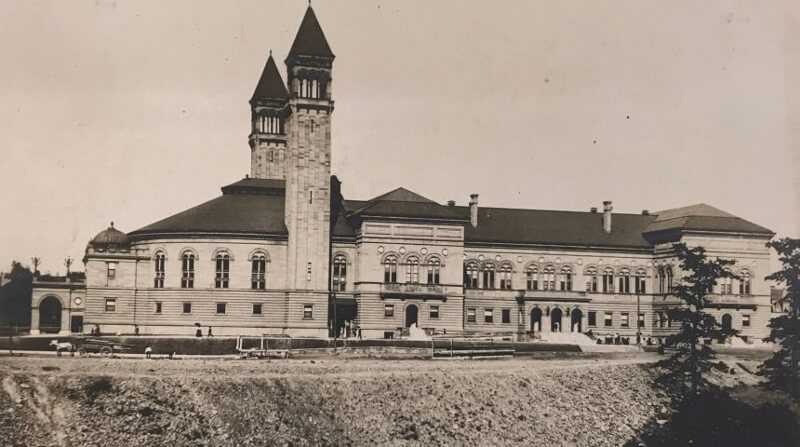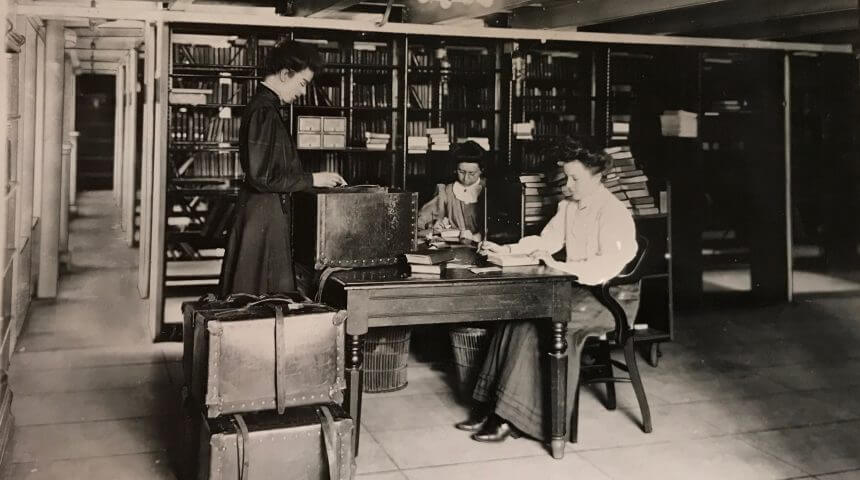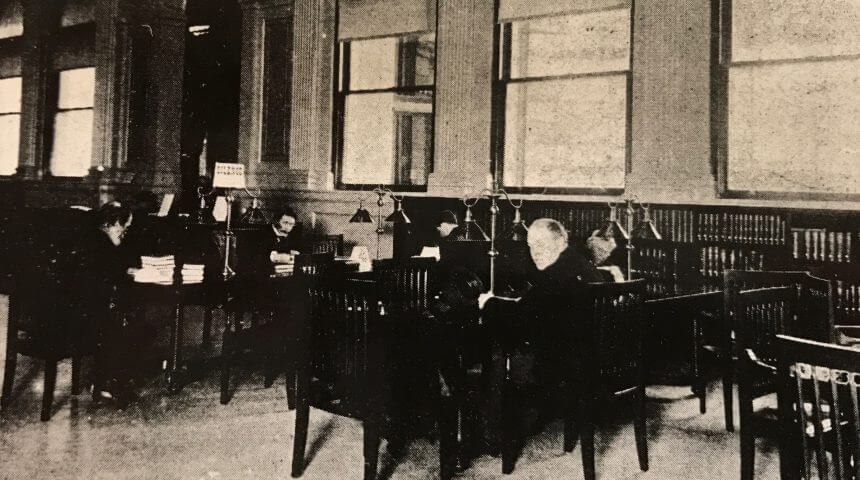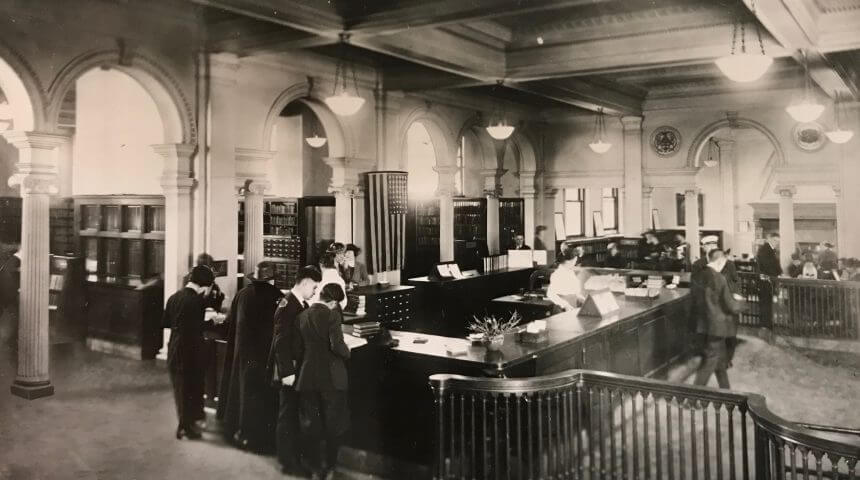
The main branch of the Carnegie Library in Oakland opened in 1895, naturally with a building that is so old, over the years stories have emerged about strange things happening that could not be explained. We’ll look at three stories told by local tour guides, media stations, and workplace folklore. Curl up tight, turn off the lights, here we go….
The Judge was here
“A local city judge frequented the library after it opened in 1895. He was a regular visitor, often seen among the stacks. One day, in the early 1900s, for reasons unknown, he hung himself in the stacks. His body was found and removed. Then, the staff reported seeing mysterious writing appear. But, the writing wasn’t at the level any human hand could reach. It was up high on the ceiling, near the spot of the hanging noose. The writing is always the same, “Sentio Est Hic” Latin for the “Judge is Here.”
If you have worked at CLP-Main, this is the most common ghost story that has been passed on for generations. I was skeptical of this story, because I’d never seen any writing appear. I had never heard first-hand accounts from anyone I worked with (some who have worked here for 40 years) see writing appear in that area. I thought, well this would be an easy story to debunk. Let’s find a list of city judges who died between 1895 and 1910. So that’s what I did.
First, I contacted the city of Pittsburgh’s archivist. He stated that as far as he knew, the city doesn’t have judges. That is a county jurisdiction. So, next I was pointed to the Law Library of Allegheny County. I found a list of judges of the court of common pleas and orphans courts from Smull’s Legislative Handbooks from 1895-1910. The following is a list of Allegheny county judges who departed this earth between 1895 and 1910:
Name Court Died
Thomas Ewing Common Pleas 5/9/1897
John W. F. White Common Pleas 11/5/1900
Jacob F. Slagle Common Pleas 11/6/1900
Christopher Magee Common Pleas 3/15/1905
John C. Haymaker Common Pleas 4/8/1905
John D Shafer Common Pleas 4/9/1905
Frederick H. Collier Common Pleas 10/29/1906
None of the gentlemen above died in the library. After finding this list, I again thought about the terminology of the original story, which refers to a “city judge” or “local judge.” This term probably refers to a local municipal magistrate, someone who is voted into their position by the people of the magisterial district they serve. I can see why the story stuck with, “the judge.” It’s not as scary to say, “Watch out in the stacks, you could run into the municipal magistrate…”
I thought I had put this ghost story to rest, by showing that no Allegheny County judge had died in the library. But, it seems until someone finds a list of municipal magistrates who departed in the early 1900s, the story of a spirit roaming the stacks could be true…

The Workman that Never Left
“A staff person in the basement saw a man standing next to the electrical box. As the library staff went to approach the man, he suddenly disappeared. The staff person asked his supervisor why someone was in the basement, which is off limits to patrons. The supervisor told him, in a whispered voice, it was a workman who had been electrocuted while installing the electrical box the day the Carnegie Library got electricity.”
From Book Riot, by Cassandra Neace, 2012
When I checked in with the facilities staff about this story, no one had heard of it before. Plus, the library has way more than “one electrical box.” While it could be possible, no one currently working at the library is familiar with the story. Personally, I feel like this is a common story associated with old buildings. No proof has been found to back up this story.

The Books that Move Themselves
“Every night, all the librarians make sure all the book are properly shelved. The next
morning they will come in, and the books are scattered all over the floor. It’s always
the mystery books. The librarians try to outsmart the spirit by moving the books to
another area, but always the books end up on the floor.”
I spoke with a few librarians to see if this ever happens. No one I spoke with recalled any regularly occurring event where books were knocked off the shelves.
Actually, there is a scientific reason that some books “pop” off of bookshelves. Books nowadays are covered in book cloth, but long ago many books were covered with vellum. Vellum is fine parchment made originally from the skin of a calf. This parchment is very hygroscopic, which means it absorbs and releases water at a high rate, like a sponge. Libraries did not have climate control until the 20th century, so every spring when there was more moisture in the air, those rows and rows of vellum books expanded, and they expanded so much so, that they squeezed out books that were closer to the edge of the book shelf, sometimes “popping” them off of the shelf!

References
Ghosts of Pittsburgh: Carnegie Library
http://pittsburgh.cbslocal.com/2016/10/27/ghosts-of-pittsburgh-carnegie-library/
Parchment Storage – Library of Congress
http://loc.gov/preservation/scientists/projects/par_cold.html
The Haunted Libraries of Pittsburgh
https://bookriot.com/2012/10/31/the-haunted-libraries-of-pittsburgh/
Three Rivers Haunts & History
https://sites.google.com/site/hauntsandhistory/threerivershauntsandhistorya
The Odds are Stacked in Our Favor
https://eleventhstack.wordpress.com/2014/09/03/the-odds-are-stacked-in-our-favor/
Hathi Trust – Smull’s Legislative handbook
https://catalog.hathitrust.org/Record/009812086
Amy Williams is a book and paper conservator working in the Conservation, Preservation and Access Department at the Carnegie Library in Oakland. Amy is a gumbander who grew up in Pittsburgh in the 80s, lived in Texas a few years, and moved back to the ‘Burgh in 2007 to fix old books and paper.
